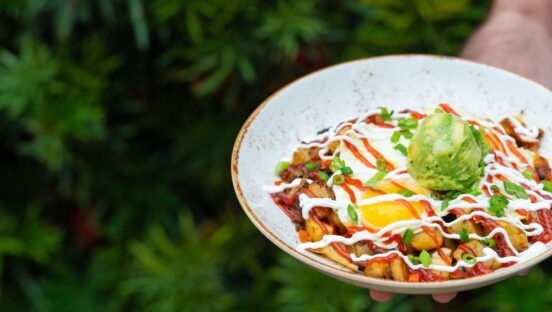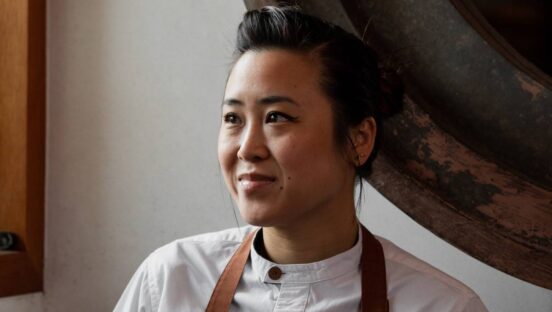










“We are all immigrants, and everyone needs to know that. My country is France, this is where I come from; my home is San Francisco. I believe in immigration. We need immigration in this country and in the world to find diversity and to understand diversity. We need to be surrounded with others’ ideas, and we need to welcome others. But I also understand the rules. You can’t expect everywhere in the world to come here and destroy this country; that’s not what we want. We want people to come to America—and operate in the culture—but also bring a part of their culture. That’s what is really cool about America.”
“I disagree with the countries that treat people very poorly—especially the way they treat women and children—and I disagree with that, but I’m not going to judge a person from that country. It’s not about the person; it’s about the politics of the country. Maybe that’s why I’m in the food business. Food is about humanity. Food is about bringing people together. Food is about putting a religion on the side and understanding each other—not judge them. And I hope that every single chef in the world will use food to be a way of embracing diversity and embracing humanity. And if chefs can do that, the world will be a better place.”
“Everything is inspiration when you’re looking at the world. Everything I do in life, everything I touch, is something that I embrace, that I cherish, and something that I care about. I started writing poetry very young, when I was 4 years old. And you know, food is language, and when I express myself it is really to understand what the language is, and to try to extract the emotion out of it. Perhaps that is one way to look at things. And then there is nature: As a chef I’m touching earth and using a lot of incredible ingredients that come from nature and you need to celebrate that. And the way that you celebrate things comes sometime into words, and using beautiful words and using emotion is a way to connect with people.”
“The workforce here is very much people from south of America, and that’s what makes California so beautiful—our diversity. We all need to come together, to understand the politics of it, and put structure in, in a way that we can help the people who want to come here. … We are a country that needs to welcome and help people. I come from a country that welcomes so many people from everywhere. I am having difficulty to understand that because you have blond hair and light skin you are superior to others; I don’t understand that concept. It is very scary for me.”
“I think the best way to do things is to have people come together and open dialogue, and to create a space where people can voice their concerns. When you have a place where people can voice their concern without yelling at one another, then change can happen. We need to evolve; we need to learn to understand and to listen; we have to listen to each another. There is still war in the world. There are still kids that don’t have food on their table. I just came back from Haiti, where I launched my nonprofit organization. They don’t have sanitary things, or proper ways to go to the bathroom or take a shower. They don’t have water to drink. They live in the middle of trash. This is crazy! Who are we? Are we a world that wants to live in greed and not care about the other?”
“I believe in the true agriculture. I do not support big corporation. I am having a huge problem with Whole Foods [Market], that big corporation is really taking away the integrity of [agriculture] and really messing up the farmers. … So that’s why I say to people, “Go to the farmers’ market, don’t go to a place like Whole Foods—they don’t support the right people. Go to the farmers’ market. Go to that friend of a farmer named Norman. He has a farm up north, and look at his hand. It’s dirty. You know that he works with his hands. He works very hard. Buy from him. Talk to him; listen. Know his story. Help him.” That’s very important. You need to understand that the farmers know this story better than us. For chefs to tell farmers to grow what we want, that is so narcissistic and so selfish, because that’s not about the farmer, that’s about the chef.”
“We’re not the rock stars; we’re not the celebrity. The farmer is the rock star. The farmer is taking care of the land. The farmer knows better if the tomato can grow there or if a zucchini can grow there. Who are you to tell the farmer what to do? We need to change the way we think about food. If [something] is not available, don’t put it on your menu. Don’t ask the farmer to grow asparagus in the winter. Don’t ask the farmer to grow a tomato in the winter when it is not available in the winter. That will be the key to the future of food. We need to rethink the way we do our menus. We need to be seasonal; we need to understand what is growing at the time; we need to help the farmers. When they say, “This is what is happening in the next month, can you do anything with it?” As the chef, we should be “Of course! We’re going to be working with whatever you give us.” And that’s very important.”
“We need to be able to learn about new things and eat diversity of food. We have to balance this planet. Look at the meat industry right now: A long time ago it was balanced. You didn’t eat meat every day; you ate vegetables and fish because that’s the way we need to balance things. Now, we have to have meat all the time, and that’s creating a problem in the world. It’s all about education. The food I’m going to cook for my children is going to be diverse. Why? Because diversity in their palate is going to create diversity in their mind.”
“We need food to survive, but it comes with a big price. I’m just trying to understand: How can we help? Also what interests me: How can we help people even in America? There are kids who don’t have food on the table. How can we help the schools? And help children to eat properly. This is alarming. And I’m not sure that the new secretary of education can tackle that, and that is scary too. The children are the future, if you don’t take of the children, if you don’t feed them properly, if you don’t educate them properly, you’re not going to be great in this world.”
Everything is from my experiences. Atelier Crenn pays homage to my dad. He was not a chef; he was a politician—but he taught me about life; he taught me about diversity; he taught me a lot of things about the world and respecting the world, respecting others, and bringing people together. I learned art is very important, education is very important, being curious in life is very important, and being open to discussion with people who don’t agree with you. Sharing and learning, that’s what Atelier Crenn is about. Petit Crenn is an homage [to] my grandmother and my mother, and it is in homage of women in general, who usually are the cooks in their homes, and the way they cook is to share the love and to bring the family together.
My dad said to me, “Dom, this is not what life is about. It’s not about how much money you have. It’s how much you give—from the bottom of your soul to others. It’s how much you inspire. Money is not going to get you anything. Those things you see have no value, they make you less than you are.” And I was only about 9 years old, but I thought, “Really?” Still, it was very interesting, and maybe that’s why I’m driving a little smart car. I don’t care about luxury. What I care about are the luxuries inside of people’s heart, and that’s the best luxury. If you come to my restaurant, there’s not a $10,000 chandelier on the ceiling. There is nothing luxury—there is no gold. When you walk into my place, you feel good, you feel taken care, you feel comfortable, you feel calm. And for me, that is luxury.











